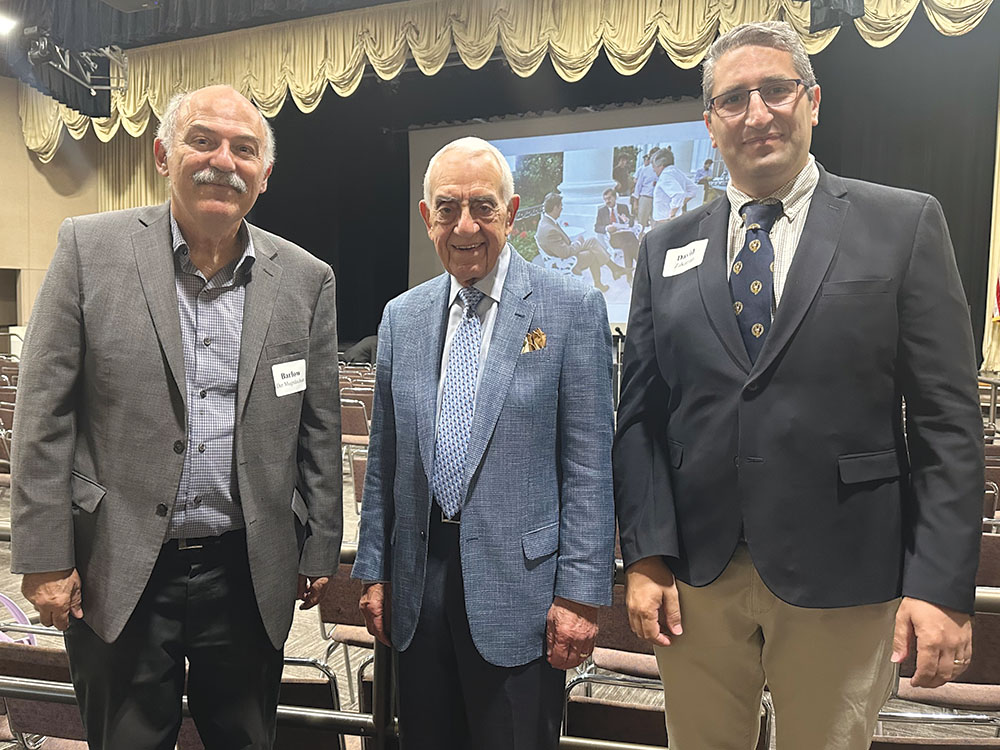
Lori Agazarian
Staff Writer
Ken Khachigian, author of Behind Closed Doors: In the Room with Reagan & Nixon, spoke to a large audience at Fresno State on Thursday, September 5, 2024. Khachigian recounted his experiences at the White House and his personal relationships with former presidents Ronald Reagan and Richard Nixon.
Veteran journalist Jim Boren conducted an interview style presentation with Khachigian, who provided an insider perspective of the behind the scenes of American leadership.
Khachigian’s visit was co-sponsored by Valley Children’s Healthcare, Fresno State’s Office of the President, The Maddy Institute, the Armenian Studies Program, and the Institute for Media and Public Trust at Fresno State.
Khachigian had taken an interest in politics and government from an early age, when he participated in the Boys State program in Sacramento in 1961. He described his time there as a hands-on workshop intended to create a mock-government. In 1962, Khachigian became the student body vice president at the University of California, Santa Barbara (UCSB), where he had the opportunity to introduce many public speakers, which was how he met Ronald Reagan for the first time.
After graduating, Khachigian attended Columbia Law School, where he wrote a letter to Reagan asking for a job at the White House. When he reached out a second time, Khachigian heard back from Pat Buchanan, who gave him an interview and offered him a summer job. This was Khachigian’s first job at the White House and the beginning of his journey to become a presidential advisor.
Khachigian worked alongside and defended President Nixon during the Watergate scandal. Khachigian described himself, at the time, as “an eager and strong advocate at 29 years old.” He had the responsibility to write a memoir for Nixon that had two main purposes: to restore Nixon’s financial stability and to tell the story of his presidency.
Khachigian was present for many notable moments of American history, including Nixon’s resignation from office on August 9, 1974. People often describe Nixon as a person who was “standoffish” and “intro-verted,” but Khachigian said he was easy to engage with, even considerably easier than President Reagan. Khachigian explained how during the 1976 campaign, he watched how Nixon would observe Reagan and communicate with others, discovering Nixon’s strengths and flaws. These observations would have a big impact on Khachigian’s understanding of communication throughout his time at the White House.
Following his impactful time by the side of Nixon, Khachigian became the presidential advisor for Ronald Reagan and worked closely with him throughout his presidency. He developed a close relationship with Reagan and his wife Nancy, and became someone they depended on. Reflecting on his time with the Reagans, Khachigian explained how “Mrs. Reagan’s only priority was always Ronald Reagan.”
Khachigian recalls many instances where he would arrive back home, only to receive a call from the White House requesting him to return because Reagan needed him. One moment in particular was when Reagan began facing controversy over his alleged anti-Jewish remarks. This was the only meeting Khachigian had with Reagan where there was no photography or documentation present, and the first time he really saw Reagan at a low point.
It became Khachigian’s job to write and manage the speeches Reagan was to give on the issue. He often struggled from writer’s block and couldn’t find the words to create this important speech. Khachigian then realized that “the Armenian Genocide and the Jewish Holocaust were identical situations.” With this, he was able to take his personal emotions and thoughts about the Armenian Genocide and translate it into a poetic and meaningful presidential speech that Reagan gave at the Bergen-Belsen concentration camp. It became one of the most important and influential presidential speeches ever given. Khachigian tells how the “writer’s block sort of just melted out of [him]” when he made the connection to the Armenian Genocide.
By communicating his personal experiences and accounts, Khachigian was able to share his time spent at the White House with two of the most notable presidents in American history.
https://posthillpress.com/book/behind-closed-doors-in-the-room-with-reagan-and-nixon
 Hye Sharzhoom Armenian Action
Hye Sharzhoom Armenian Action